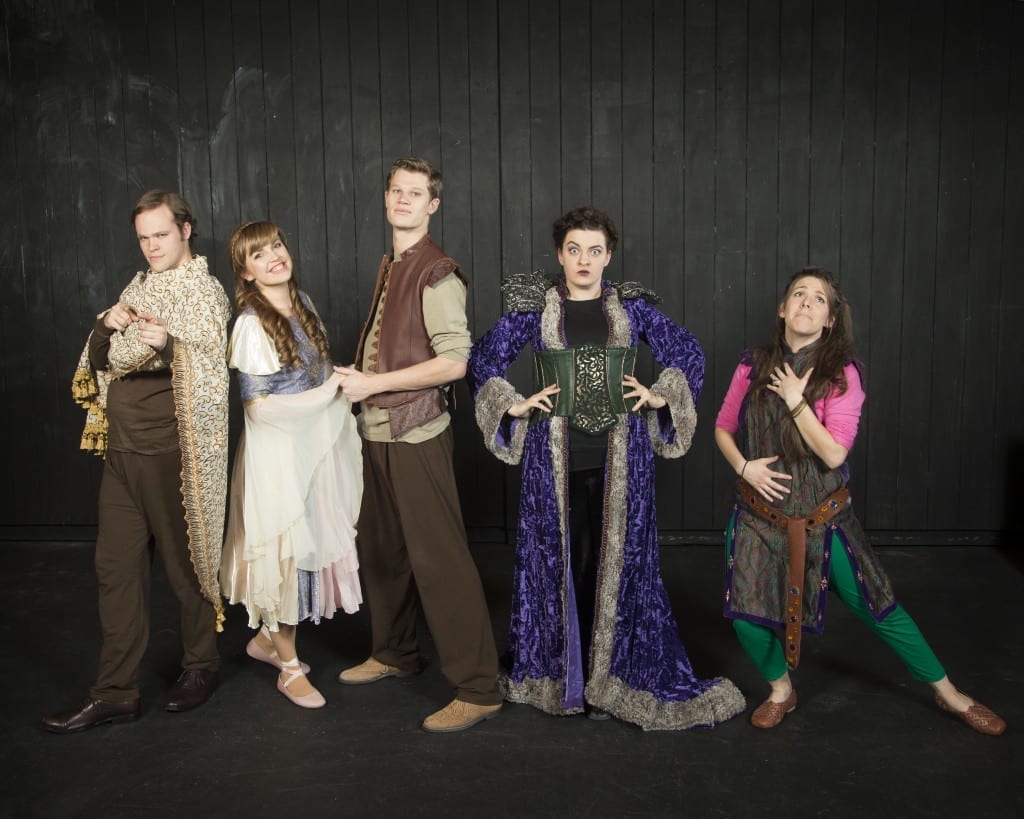PROVO — On the surface, Cymbeline is an unlikely candidate for a theatre production for young audiences. In addition to its gruesome violence the play features a major plot point about a mole on the main female character’s body in a distinctively non-family friendly place. But if anyone can convert a Shakespeare play into an appropriate and entertaining play for children, it’s BYU’s Young Company. With its proven track record of creating engaging theatre for young audiences, Young Company is ideally suited to create this 60-minute evening for kids.

The story focuses on Imogen (Emma Widtfeldt), the daughter of King Cymbeline, who flees the court after her husband that she secretly married, Leonatus (Bryson Alley), is banished from the kingdom. The king’s evil wife (Amberly Plourde) engages in a plot to kill so that her son, Cloten, can marry Imogen so she can be killed and Cloten can inherit the British throne. Iachimo, a rogue, thrusts himself into the story by stealing the bracelet that Leonatus gave to Imogene and claiming that she has been unfaithful to him. Complicating the story are the political maneuverings between Cymbeline’s kingdom and the Roman empire, which culminates in a battle at the end of the play.
Teresa Dayley Love‘s adaptation is full of charm. Love created two different versions of the play: a fairy tale and a film noir version. The setting of the fairy tale version (which I saw) was enjoyable because Love capitalized on the motifs that the play shared with Snow White and the Seven Dwarves, such as an evil queen, a henchman who doesn’t have the heart to kill the beautiful princess, and a magic potion. These commonalities made the unfamiliar story of Cymbeline accessible for both children and adults. Love also had the character of Philaria (Mary Beth Bosen) act as a narrator for the story, moving the action from one scene to another and frequently explaining the Shakespearean language and action to the audience.

Bosen had more than enough charisma to carry the burden of being a narrator. With more stage time than the other four cast members, Bosen was the unifying force of an otherwise diffuse story. Her frequent encouragements for audience interaction never felt forced, nor did her exposition. Clyde Northrup had triple duty playing Iachimo, Pisanio, and Papa Morgan, all of which he differentiated well enough that most children probably would not be confused by the same actor playing multiple characters. Northrup also made it clear to the young audience when Iachimo was lying to Imogen and couldn’t be trusted. Northrup had created the strongest scene of the play with Widtfeldt in the forest, when Pisanio is supposed to kill Imogene; Northrup seemed truly distraught in this scene, which was the most emotional scene in the play.
Alley’s Leonatus was a dashing actor who fit well into the stereotypical “Prince Charming” role, which reinforced the familiarity of the story. I have similar feelings about Widtfeldt, who as Imogen was well adapted to the distressed princess role, especially in the second half of the play in her scenes with Northrup. Finally, Plourde’s performance as the evil queen and as Lucius was a show stealer, as her ad libs and over-the-top humor established the silly, fun mood that permeated most of the play. Because several children from the audience were used to portray some of the other characters in the play, Plourde had several opportunities to inject spontaneous humor into the dialogue, and she consistently capitalized on these opportunities.
Shakespeare purists will notice many aspects of Cymbeline that are missing. The violence is a little cartoony, and there is no mention of the mole under Imogen’s breast. This is, after all a production for young audiences created by BYU. Love’s adaptation is very free with the language, and often paraphrases are used in place of Shakespeare’s words. But the final product is a nice 60-minute version of Cymbeline that elementary school-aged children and their parents would enjoy.
[box type=”shadow”]Cymbeline plays every weeknight (except Monday) at 7 PM, Saturdays at 11 AM, 2 PM, and 4 PM, with additional performances on Fridays at 9 PM in the Margetts Theatre in the Harris Fine Arts Center on the campus of Brigham Young University. Tickets are $4-6. For more information, visit www.byuarts.com.[/box]

